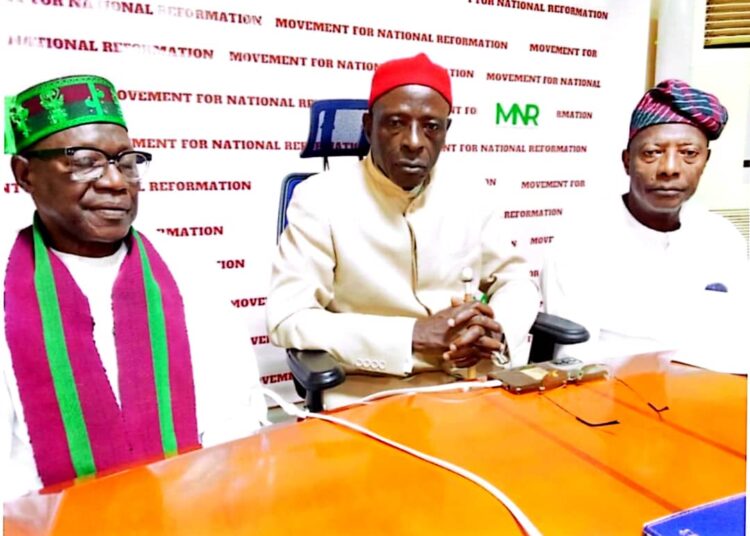In a bid to ensuring inclusions of good governance the Movement for National Reformation (MNR) has advocates true federalism system in the country.
As a non-partisan, non-profit, pan-Nigerian institution, MNR strives to offer the best advice on governance and federalism to governments in Nigeria. In the current national discourse ON restructuring, they have submitted Memoranda to both the Senate and the House of Representatives, wherein we called for the restoration of the 1963 Constitution of the Federal Republic of Nigeria (CFRN) for amendment with current realities.
It is imperative to reiterate that, the call for the restoration of the 1963 CFRN is essentially for the tenets of federalism contained therein, and not for a reversion to the defunct four (4) federating units that were referred to as regions. A restoration of the 1963 CFRN will be adjusted to suit the present realities of the existing 36 states to be the federating units.
Group noted that the 1963 CFRN is the only existing federal constitution in Nigeria that emerged through a bottom-top process that fits the mantra of “We the People” in its preamble. It was only suspended, but never abrogated, when civil governance in the first republic was truncated in January 1966. Thus, its restoration will address the national clamour for restructuring which is consuming public debate across the country.
In a statement recently signed by the Chairman and Secretary of MNR Constitution Review Committee, Prof O. Igho Natufe and Dr. Yemi Adegoke, the Group reiterated that the 1999 Constitution that derived from the Schedule to Decree No 24 of 1999 is a document fully encrusted in unitary tenets, even though it is christened a federal constitution. MNR strongly believes that a federation exists because federating units agree to federate.
Statement read in parts: this is a universally accepted principle in the formation of a federal polity, as exemplified by the practice in USA, Canada; and in Nigeria where the where the erstwhile three (3) federating units (the Eastern Region, Northern Region, and Western Region) negotiated the terms of federalism and decided on the powers to concede to the central government.
This was how the Founding Fathers of Nigeria agreed on the 1954, 1960 and eventually the 1963 constitution during the period of decolonisation. The 1963 CFRN replaced the 1960 Constitution when Nigeria became a Republic and included the Midwest Region as the fourth federating unit, following its creation in August 1963.
“Since the collapse of the First Republic on January 15, 1966, constitution making in Nigeria has deviated from the universally accepted principle of the federating units negotiating and agreeing on the terms of federalism. For example, the military government usurped the functions of the federating units by foisting its Decree No 24 of 1999 as a ”federal” constitution that is devoid of the basic iota of the tenets of federalism.”
“In the current 1999 Constitution, the states that ought to be rightly and judged as the federating units, function as mere administrative branches of the central government. This compelled a Nigerian politician to describe the current governance structure of Nigeria as a ”feeding bottle federalism”. We need to restructure the country and restore the tenets of federalism by lifting the suspension on the 1963 CFRN.”
At their recent retreat in Kano on September 28, 2024, Nigerian Senators sang discordant tunes on the restructuring of Nigeria. It was reported that they differed “over the agitation for a return to a regional system of government”. (Kayode Lawal, “Nigerian Senators clash over regional government proposal”, Nigerian senators clash over regional government proposal – Daily Post Nigeria, September 29, 2024). It is unclear what the Senate Leader, Opayemi Bamidele meant when he allegedly “assured Nigerians that the issue of regionalism was not part of the ongoing constitution review”.
It is the view of MNR that regionalism facilitates stability in a multi-ethnic and multi-religious polity like Nigeria. Therefore, a denial of regionalism will encourage the emergence of centrifugal forces with severe consequences for the political system. Nigerians should embrace regionalism as recognition of the diverse social mosaic of Nigeria.
This core principle explains the resilience of federalism in Canada, the US, India and Switzerland, for instance. Nigerians benefited from this concept of regionalism until the military intruded in civil governance and politics in Nigeria. To discard regionalism and pretend to construct a federal polity is tantamount to extinguishing the rights of federating units and indigenous ethnic nationalities in a multi-ethnic country like Nigeria. Sir Ahmadu Bello succinctly underlined this imperative during the debate on federalism in pre-independence Nigeria. He opined:
“We must aim at a looser structure for Nigeria while preserving its general pattern – a structure which would give the Regions the greatest possible freedom of movement and actions; a structure which would reduce the power of the Centre to the absolute minimum and yet retain sufficient national unity for practical and international purposes”.
The then three (3) federating units accepted the Bello thesis as a vital ingredient in the building of a federal political system in Nigeria, an acceptance which led to the 1960 (and subsequently 1963) Federal Constitution. A supposedly federal political system that negates the basic principle of federalism and cruises on a unitary order cannot claim to be federalism compliant. A federal political system cannot be a prison of nationalities. The demise of the Soviet Union, Czechoslovakia and Yugoslavia provide vivid consequences of the denial of regionalism in their respective “federal” political systems.
“An important issue that must be understood in constitution making is that the Constitution of Nigeria does not belong to the Federal Government or the National Assembly. Therefore, to state that “The only people that are given this mandate to look at the Constitution and amend it are, of course, members of the National Assembly.”
“In fact, the States, as the federating units, are the ones to decide on the powers to concede to the central government. A contrary process is anti-federalism. It is suicidal to postulate that “true federalism was no longer fashionable because many countries in Africa had discarded it”, as a leading Senator argued at the Retreat in Kano.”
This retrogressive mindset explains the insistence of some legislators on the preservation of the 1999 unitary constitution. It is deceptive to pretend to “enhance good governance and curb corruption and insecurity” while simultaneously denying indigenous ethnic nationalities, the real federating units, their rights in a supposedly federal polity.
The question of regional (or State) police is a given in a federal political system. States that are ready and able to establish their state police should do so immediately. Those that are not ready can elect to retain the Federal Police via their respective bilateral agreements with the Federal Government.
To delay the states that are ready and able is a denial of their rights as federating units. Asymmetry in governance recognizes the regional variances in a federal polity. Thus, we cannot asphyxiate asymmetry and hope to build a vibrant federal political system. To reject regionalism is an end of federalism. A restoration of the 1963 CFRN is congruent with President Bola Ahmed Tinubu’s determination “to embrace our diversity and manage our differences better as we continue to work towards engendering a more perfect union”. (Full Text Of Tinubu’s 2024 Independence Day Speech, Tuesday, October 1, 2024 at 7:13 AM By Ijeoma. Full Text Of Tinubu’s 2024 Independence Day Speech (dockaysworld.com.ng)
It is necessary to point out that the unitary tenets of the 1999 CFRN (as amended) is bedeviled with undergirded structural problems that are perceived or warped as mere operational problems. The overbearing ethnic cum religious balance of power breeds political and moral corruption as well as economic and social problems that stifle manpower development.
It was colonial “force” that “integrated” the territories of diverse ethnicities into Nigeria as a single territorial entity by war, law and praxis of settler colonization. As a result, colonialism incubated federalism in Nigeria as a framework for diversity management of the forced integration; which makes the diverse ethnicities the federating units of the federal republic of Nigeria. The clamour for restructuring is to make the ethnicities the bedrock and basis of the federating units, of which some would be homogeneous (major ethnic nationalities) or heterogeneous (minor ethnic nationalities units.
In the era of decolonisation from March 1953 to September 1963, the diverse ethnicities had two options; (1) to sustain Nigeria as a single entity based on the framework of federalism for diversity management or (2) to revert to ethnic boundaries of statecraft that predated colonialism.
The choice of the first option in the decolonization process by the founding fathers of Nigeria was rooted and guided by (i) the experiences gained from colonial administration that started from 1861, 1900, 1906 and 1914 including Constitutional conferences in London and in Nigeria; (ii) negotiated agreements of ethnicities at the Lagos constitutional conference of July 25-26, 1963 that led to the enactment of the 1963 CFRN on October 1, 1963 by the Federal House of Representatives. Thus, the 1963 CFRN emerged from a bottom-top approach that fits the mantra of its preamble of “We the People” as well as the acceptance of federalism as a framework of managing the diversity of the heterogeneous territories that were integrated into a single one named Nigeria.
To inspire the future of the novel Federal Republic of Nigeria, the founding fathers of the federation honored the colonial past that eventually crystallized into self-rule on 1st October 1963 by replicating a two-tier federal system that reflects the best global practices of governing a plural polity with the enactment of the bottom-top 1963 CFRN. It is in Nigeria’s interest that the 1963 CFRN be restored and amended with current realities.





